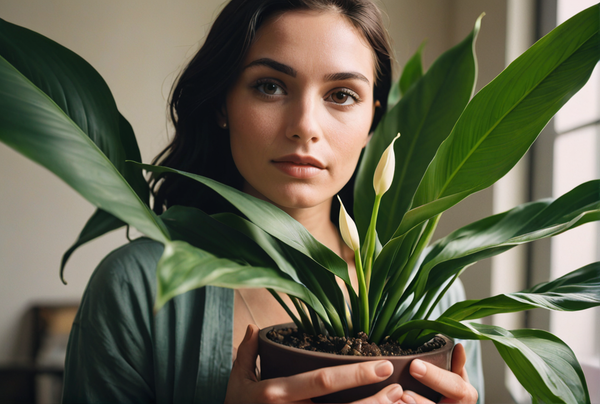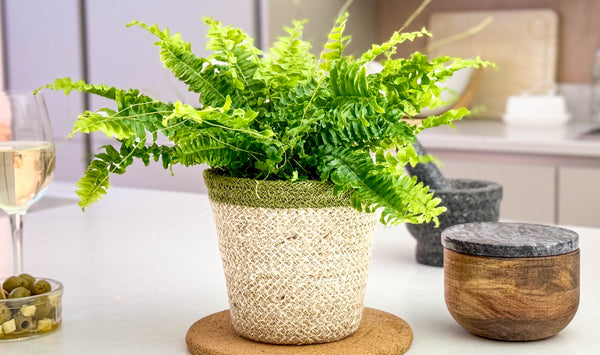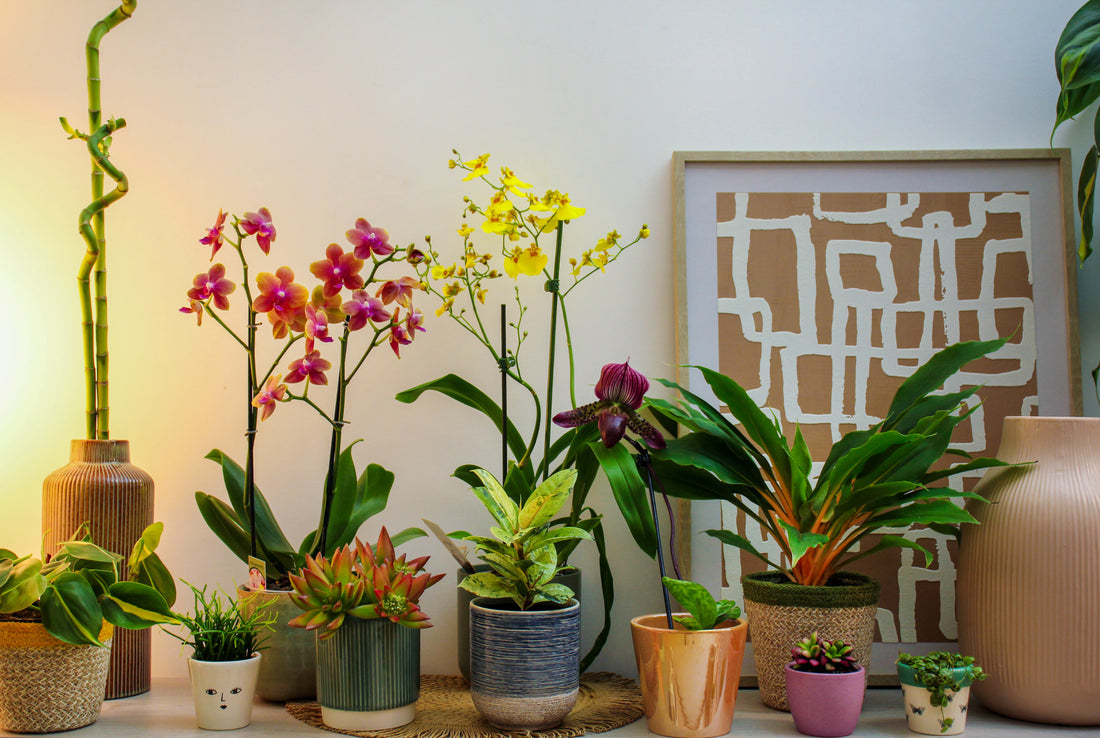The History of Mother's Day
Mother's Day is a cherished celebration that has its roots in honouring the unwavering love, nurturing spirit, and selfless sacrifices of mothers throughout history. While the modern-day observance has evolved over time, the underlying essence of appreciating and cherishing the maternal bond remains unchanged.
Here in the United Kingdom, the tradition of Mothering Sunday dates back to the 16th century, when domestic servants were given a day off to visit their mothers and attend a special church service. This practice eventually paved the way for the contemporary celebration of Mother's Day, which in the UK is observed on the fourth Sunday of Lent, also known as Refreshment Sunday.
The act of gifting has been an integral part of Mother's Day celebrations, and throughout history, plants and flowers have held a significant place in this tradition, which is why many people find that buying an indoor plant makes the perfect gift. In ancient civilisations, goddesses and mother figures were often represented by or associated with various plant species, symbolising the nurturing and life-giving qualities of motherhood.
In the Victorian era, the language of flowers became a popular means of expressing sentiments, and certain blooms were associated with maternal love, devotion, and appreciation. This symbolic connection between plants and motherhood has endured, making indoor plants, houseplants and floral arrangements a cherished and meaningful gift choice for Mother's Day.
Connection between Indoor Plants and Mother's Day
Indoor plants have become an increasingly popular gift choice for Mother's Day, and there are several compelling reasons behind this trend. Beyond their aesthetic appeal and ability to bring a touch of nature into our living spaces, houseplants hold a deeper symbolic significance that resonates with the essence of motherhood.
Nurturing and Growth: Mothers are often likened to nurturers, providing care, support, and guidance to help their children grow and thrive. Similarly, indoor plants require careful tending, watering, and attention to flourish. The act of caring for a houseplant can serve as a gentle reminder of a mother's nurturing role and the joy that comes from witnessing growth and development.
Resilience and Strength: Many houseplants are remarkably resilient, adapting to various indoor conditions and overcoming challenges to survive and thrive. This resilience can be seen as a reflection of a mother's unwavering strength, perseverance, and ability to navigate life's ups and downs while supporting her family.
Life and Renewal: Plants represent the cycle of life, with their ability to regenerate, bloom, and bear fruit serving as a metaphor for the continuous renewal and growth that mothers foster within their families. Gifting an indoor plant can symbolise the gift of life and the hope for future generations to flourish.
Purification and Healing: Numerous studies have highlighted the benefits of indoor plants in improving air quality and promoting overall well-being. This connection to purification and healing can be seen as a tribute to a mother's nurturing touch, which can provide comfort and solace during challenging times.
Cultural Symbolism: In various cultures, certain plant species hold symbolic meanings related to motherhood, fertility, and familial bonds. For example, the jade plant is believed to bring good luck and prosperity in some Asian traditions, making it a meaningful gift for mothers.
By gifting an indoor plant on Mother's Day, one not only presents a beautiful and living decoration but also celebrates the profound bond between a mother and her children. The plant serves as a tangible representation of the nurturing, resilience, life-giving qualities, and healing presence that mothers embody.

Common Houseplants Gifted Around the World
When it comes to gifting houseplants for Mother's Day or any other occasion, certain species have emerged as popular choices globally due to their beauty, symbolic meanings, and ease of care. Here are some of the most commonly gifted indoor plants around the world, plus as we stock many rare and exotic plants all of the below can be purchased with express UK delivery:
Pothos (Epipremnum aureum)
- Appearance: Trailing vines with heart-shaped leaves in shades of green, yellow, or white variegation.
- Care Requirements: Thrives in indirect bright light and prefers well-draining soil. Water when the top inch of soil is dry.
- Symbolism: The pothos is believed to bring good luck and prosperity, making it a thoughtful gift for mothers.
- Appearance: Glossy, dark green leaves with white, spathe-like flowers that resemble calla lilies.
- Care Requirements: Prefers bright, indirect light and consistent moisture. Allow the soil to dry slightly between waterings.
- Symbolism: The peace lily is associated with peace, purity, and innocence, making it a fitting gift for mothers who bring harmony and serenity to their families.
- Appearance: Upright, sword-like leaves in shades of green with yellow or white stripes or edges.
- Care Requirements: Tolerates low light conditions and infrequent watering. Prefers well-draining soil.
- Symbolism: The snake plant is believed to bring good luck and protection, making it a meaningful gift for mothers who nurture and safeguard their families.
- Appearance: Upright, oval-shaped leaves in various shades of green, often with red, pink, or silver patterns or variegation.
- Care Requirements: Prefers bright, indirect light and well-draining soil. Water when the top inch of soil is dry.
- Symbolism: The Chinese evergreen is associated with good fortune and prosperity, making it a thoughtful gift for mothers who bring abundance and blessings to their families.
These are just a few examples of the many houseplants that are commonly gifted around the world for Mother's Day and other occasions. Each plant holds its own unique beauty, symbolism, and cultural significance, making them meaningful and thoughtful gifts to honour and celebrate the special bond between mothers and their loved ones.

Perfect Indoor Plants for the UK
While many houseplants can thrive in the UK climate and conditions, certain species stand out as particularly well-suited for gifting and cultivating indoors. These plants not only add a touch of natural beauty to any living space but also require minimal maintenance, making them ideal choices for busy households or those new to plant parenthood.
- Appearance: Trailing vines with distinctive lobed leaves in shades of green, sometimes with variegation or white veining.
- Care Requirements: Prefers bright, indirect light and well-draining soil. Water when the top inch of soil is dry.
- Why It's Perfect for the UK: English ivy is a hardy, evergreen plant native to the UK, making it well-adapted to the local climate and conditions. Its trailing vines add a touch of elegance to any indoor setting.
Cast Iron Plant (Aspidistra elatior)
- Appearance: Upright, lance-shaped leaves in a deep, glossy green colour, often with intricate patterns or variegation.
- Care Requirements: Tolerates low light conditions and infrequent watering. Prefers well-draining soil.
- Why It's Perfect for the UK: The cast iron plant is incredibly resilient and can thrive in a variety of indoor environments, making it a low-maintenance choice for homes or offices with limited natural light.
Spider Plant (Chlorophytum comosum)
- Appearance: Arching, grass-like leaves with long, thin stems that produce small plantlets (baby plants) at their tips.
- Care Requirements: Prefers bright, indirect light and well-draining soil. Water when the top inch of soil is dry.
- Why It's Perfect for the UK: The spider plant is an easy-to-care-for houseplant that can adapt to various indoor conditions, making it a great choice for beginners or those with limited gardening experience.
Boston Fern (Nephrolepis exaltata)
- Appearance: Feathery, arching fronds in shades of green, creating a lush and tropical vibe.
- Care Requirements: Prefers bright, indirect light and consistently moist (but not saturated) soil.
- Why It's Perfect for the UK: Boston ferns thrive in the cool, humid conditions found in many UK homes, making them a great choice for adding a touch of greenery and natural beauty to any indoor space.
Common Questions About Gifting Indoor Plants
When it comes to gifting houseplants, especially for special occasions like Mother's Day, there are often questions that arise. To help you make an informed decision and ensure your living gift is a success, we've compiled some of the most common questions and provided detailed answers.
What are the benefits of gifting indoor plants?
Indoor plants offer numerous benefits beyond their aesthetic appeal. They can purify the air by removing harmful pollutants, improve mental well-being by reducing stress and anxiety, and even boost productivity and creativity. Additionally, caring for a plant can be a rewarding and therapeutic experience, fostering a sense of responsibility and nurturing.
How do I choose the right plant for the recipient?
Consider the recipient's lifestyle, available space, and light conditions in their home or office. Low-maintenance plants like succulents or air plants are ideal for those with busy schedules or limited gardening experience. For brighter areas, opt for plants that thrive in direct sunlight, such as cacti or aloe vera. Evaluate the recipient's personal style and preferences to select a plant that complements their decor.
How do I care for the plant before gifting?
Proper care before gifting is crucial to ensure the plant arrives in optimal condition. Water the plant thoroughly a day or two before delivering or gifting it. Remove any dead or damaged leaves or stems, and consider repotting the plant in a decorative container for a fresh, presentable look.
What are some creative ways to present a plant as a gift?
Get creative with the presentation! Consider pairing the plant with a stylish planter or basket, adding decorative elements like ribbons or natural accents, or creating a themed gift basket with additional items like gardening tools, plant care guides, or personalised notes.
How do I ensure the plant's longevity after gifting?
Provide the recipient with clear care instructions, including watering guidelines, light requirements, and any specific needs of the plant species. Encourage them to research the plant's care needs and establish a routine for monitoring its health. Regular pruning, repotting, and adjusting light or water conditions as needed can help ensure the plant's longevity.

